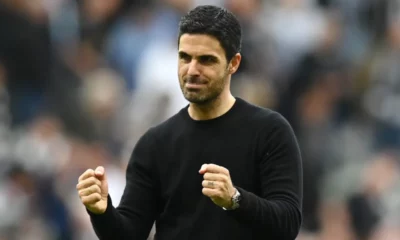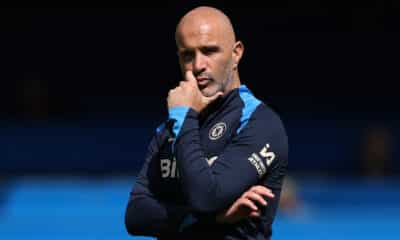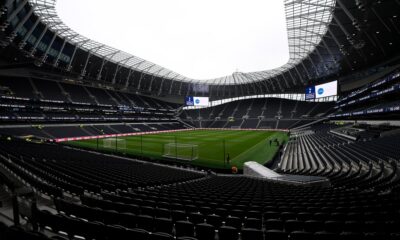Arsenal
England’s opponents – Germany
By Thom Alexander.
After a tense, yet ultimately successful, final group game, England have little time to relax after their exploits against Slovenia. The USA’s last minute winner against Algeria confirmed them as group winners, and so England will face a most familiar foe.
Or are they? Germany have been one of the most progressive nations in Europe in the past decade. Gone are the days when stoic, economical, efficient performances saw Germany through. Since the appointment of Jurgen Klinsmann in 2004, there has been more of an emphasis on short passing, movement off the ball, and no end of running. Joachim Loew has taken that blueprint, and built on it, naming the second youngest squad in the tournament. England may be facing an opponent they have played 37 times before (as East and West Germany, and the unified team), but they will be playing a very different team.
The goalkeeping position has been the most difficult for Germany to fill. After the tragic death of Robert Enke, Bayer Leverkusen’s Rene Adler was expected to take the position between the posts at the World Cup. However, a serious rib injury meant that he was unable to make the trip to South Africa. This has left Germany without an experienced shot-stopped. Indeed, the three keepers they opted to take to the World Cup have only 13 caps between them. Loew opted to elect Schalke’s talented young goalkeeper, Manuel Neuer, as his first choice, and he is the man most likely to face England. Arsenal fans may take note of his performances, as he has been linked to Wenger’s side.
The German defence is considerably more fluid than it has traditionally been, but still relies on a solid central pairing. Per Mertesacker is the towering 6ft 6’ centre-back for Werder Bremen, who is a veteran of 65 caps at just 25 years old and will pose a threat at set pieces. He will most likely be partnered in defence by the Hertha Berlin captain Arne Friedrich, who is more comfortable with the ball at his feet.
England must be wary of the threat posed by Germany’s full backs. In Philipp Lahm, the Germans have arguably the finest right-back in the world. Lahm’s marauding runs from the back can cause chaos in even the most organised of defences, and the Germany captain is not afraid of unleashing powerful shots from distance. At left back, Germany could elect to play a more attacking formation, and select Manchester City’s new acquisition, Jerome Boateng. However, the more likely option is either the youthful exuberance of Bayern Munich’s Holger Badstuber, or the experience of Hamburg’s Marcell Jansen. Both are willing and able to get forward along the flanks.
One of the features of the Klinsmann/Loew era has been the flexibility of the German formation. Never an orthodox 4-4-2, the side now has a fluid forward line and at least one creative midfielder. So much emphasis on attack has increased the importance of the holding midfielder role. The task of protecting the defence has fallen to Bastian Schweinsteiger, a converted winger. The Bayern Munich man is quick, fierce in the tackle and has been something of a revelation in his new position. Of course, his role is not limited to anchoring the midfield, and his goalscoring record is incredible. At just 25 years old, Schweinsteiger has a record of 21 goals in 77 games – a more than enviable record for a midfield player. If England are looking to avoid bad omens, they must shackle the young midfielder, as Germany have never lost a game in which “Basti” has scored.
The injury to Michael Ballack was a severe concern for Joachim Loew in the run up to the tournament. The former Chelsea player was one of few veterans that the manager could call on, and his phenomenal knack of scoring vital goals had been vital to Germany in the last decade. It is testament to Sami Khedira that Ballack has, so far, not been missed. Khedira is another young midfielder, with just 8 caps to his name. A seasoned campaigner with VfB Stuttgart, Khedira captained the German Under 21 side which beat England 4-0 in last years’ European Championship final. He is one of four starters from that final who are in the current squad, the others being Neuer, Boateng and creative midfielder Mesut Ozil.
Werder Bremen’s 21 year old Ozil has been one of the stars of the tournament so far, turning in a superlative performance against Australia, and capping a fine display against Ghana with a well taken goal. Envious eyes have been cast his way from many of Europe’s top clubs, as his value continues to soar. Stuart Pearce should know all about the danger posed by the young playmaker, as he was the man of the match against the England Under 21’s in last years’ final.
Lucas Podolski most often occupies a floating role on the left of the pitch, between midfield and attack. His late bursts into the box are a constant threat, and despite a barren season with FC Koln, he has always maintained his fine form for his country. 39 goals in just 76 matches illustrates just how potent a threat he is, despite not playing as an out-and-out striker. Podolski also has youth on his side, and at 25 years old he may yet have time to close in on Gerd Muller’s all time German goal-scoring record of 68.
Up front, Joachim Loew most regularly deploys veteran striker Miroslav Klose. Klose is the only survivor of the German side defeated by 5-1 by England in 2001, and is still their most potent goal threat, with a strike every other game. Klose is another who has not enjoyed the best of spells with his club, only managing six goals in all competitions for Bayern Munich last year. Like Podolski, Klose has always saved his best form for the National Team and with 98 caps, he is the most experienced member of the squad.
Klose will likely be deployed centrally, with either club-mate Thomas Muller or the Brazilian-born Cacau on the right. Muller is the more likely option, having been voted “most promising talent” by Kicker magazine last season. The 20 year old is very much in the mould of great German strikers, with a fierce shot, excellent close control and a powerful aerial presence. Should Cacau be preferred, then England would have to contend with an equally as powerful, but slightly more nimble threat. At Stuttgart, Cacau managed 13 goals despite only starting 19 games last season.
Germany play a high tempo game, and like to attack down both flanks. They are as dangerous at set pieces as any side in the world, and will look to work intricate passes between midfield and their wide forward players. The midfield players are equally adept at getting amongst the goals, so the threat of Schweinsteiger and, in particular, Ozil must be neutralised if England are to progress. However, there are weaknesses in the side. Germany’s full backs are very forward thinking, and may leave space for England to exploit, especially if Lahm’s runs are not covered by his midfield. Both Ghana and Serbia enjoyed some freedom between the German defence and midfield, particularly when the Germans were caught in possession.
Meetings between England and Germany are traditionally tense encounters, which are won by the odd goal (with the odd notable exception). Since the reunion of East and West Germany, England have faced their old foe eight times, winning three and drawing one. Only the match in Munich in 2001 was settled by more than one goal. However, this German side is a different beast to anything England have faced in the World Cup so far. Both sides may need to practice their penalties.














